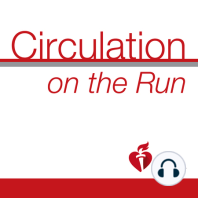25 min listen
Circulation May 27, 2019 Issue
ratings:
Length:
31 minutes
Released:
May 27, 2019
Format:
Podcast episode
Description
Dr Carolyn Lam: Welcome to Circulation on the Run, your weekly podcast summary and backstage pass to the journal and it's editors. We're your co-hosts, I'm Dr Carolyn Lam, associate editor from The National Heart Center and Duke National University of Singapore. Dr Greg Hundley: And I'm Greg Hundley, associate editor for Circulation and director of The Pauley Heart Center at VCU Health in Richmond, Virginia. Dr Carolyn Lam: Guess what Greg? Right after this we have a double feature discussion. It is all about dapagliflozin with some really, really important self-analyses from the DECLARED-TIMI 58 trial and about heart failure in Type 2 Diabetes with dapagliflozin. But, all of that coming right up only after we have our chat. So Greg, what do you have for us today? Dr Greg Hundley: My first article is going to be from Dr Mintu Turakhia at the VA Palo Alto healthcare system at Stanford University and is going to discuss the practice variation in anticoagulation prescription and outcomes after device-detected atrial fibrillation. It's a study that has insights from the VA Health Administration. This study evaluated the relationship between oral anticoagulant prescription practice variation in response to new device detected atrial fibrillation and the association to outcomes. As you know Carolyn, there are no clearly defined thresholds of AF burden, for which to initiate oral anticoagulation. Dr Carolyn Lam: Interesting, so what did they find, how did they do this? Dr Greg Hundley: Carolyn, the investigators performed a retrospective cohort analysis using data from the Veterans Health Administration linked to remote monitoring data that included day level AF burden. They included patients with cardiac implantable electronic devices and remote monitoring from the years 2011 through 2014. A CHA2DS2-VASc score of greater or equal to 2, and no prior stroke or oral anticoagulant receipt in the preceding 2 years. They determined the proportion of patients prescribed oral anticoagulants within 90 days following new device-detected AFib across a range of AFib thresholds. Greater than or equal to 6 minutes, all the way up to greater than 24 hours. And they examined sight variation in oral anticoagulation prescription. Dr Carolyn Lam: And so? What did they find? Dr Greg Hundley: Well, you ask among 10,212 patients with defibrillators, proportion receiving oral anticoagulation varied based on device detected AF burden. For example, for those greater than or equal to 6 minutes, it was roughly 13% of individuals, for those greater than 24 hours, 27% of individuals received oral anticoagulants. Importantly, there was a substantial sight variation in oral anticoagulation prescription after device-detected atrial fibrillation, for example, greater than one hour. The median was 16%, but it ranged from as low as 3% up to highs of 67%. And so, in adjusted models, oral anticoagulant prescription after device-detected AFib of greater than 24 hours was associated with reduced stroke risk and has a ratio of 0.28, p-value's 0.02, although, the propensity adjusted model was significant when AFib lasted at least 6 minutes. So, in conclusion, among veterans with implanted devices, device-detected atrial fibrillation is common. There is large practice variation in 90-day oral anticoagulation initiation after new device-detected AFib with low rates of treatment overall, even for episodes greater than 24 hours. Remember, we said that rate was 27%. The strongest association of oral anti-coagulation with reduction in stroke was observed after device-detected Afib of greater than 24 hours. And what this study shows, is that randomized trials are needed to perform these observational findings. So, Carolyn, how ab
Released:
May 27, 2019
Format:
Podcast episode
Titles in the series (100)
Circulation November 1, 2016 Issue: Dr. Carolyn Lam: Welcome to Circulation On The Run, your weekly podcast summary and backstage pass to the journal and its editors. I'm Dr. Carolyn Lam, Associate Editor from The National Heart Center and Duke National University of Singapore.... by Circulation on the Run
